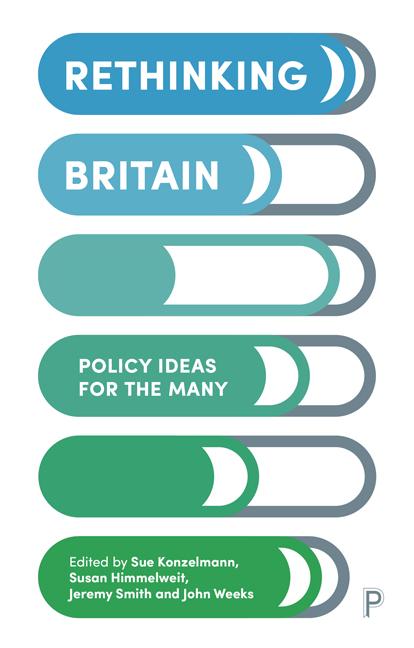Book contents
- Frontmatter
- Contents
- List of Tables and Figures
- The Contributors
- Foreword
- Introduction
- Interlude: ‘Mirror, Mirror, On the Wall – Who has the Highest Debt of All?’
- Part One Building a Full-Employment Economy: Introduction
- Part Two Public Investment – Prioritising Society Rather than Profit: Introduction
- Part Three Making Finance Work for Society: Introduction
- Part Four Genuine Social Security: Introduction
- Part Five How to provide for Social Needs: Introduction
- Conclusion
- Jargon Busters
- References and Further Reading
- Index
4 - How Should we Manage Inflation?
Published online by Cambridge University Press: 11 March 2021
- Frontmatter
- Contents
- List of Tables and Figures
- The Contributors
- Foreword
- Introduction
- Interlude: ‘Mirror, Mirror, On the Wall – Who has the Highest Debt of All?’
- Part One Building a Full-Employment Economy: Introduction
- Part Two Public Investment – Prioritising Society Rather than Profit: Introduction
- Part Three Making Finance Work for Society: Introduction
- Part Four Genuine Social Security: Introduction
- Part Five How to provide for Social Needs: Introduction
- Conclusion
- Jargon Busters
- References and Further Reading
- Index
Summary
What's the issue?
For four decades British governments have placed priority on maintaining low inflation. Under Conservative governments this functioned as a central macroeconomic policy goal. A progressive government will come under strong pressure to maintain this priority, although it is frequently in conflict with other objectives such as economic growth and full employment.
What is the appropriate inflation guideline for a progressive government?
Analysis
Private sector price increases are simultaneously increases in private sector incomes:
[price = intermediate costs + value added], [value added = wages + profits + other incomes]
By definition price increases do not themselves erode real wages. Real wages and more generally household real incomes fall as a result of the distributional effects of price increases on incomes (wages and profits) and expenditures (spending patterns across the income distribution). When private sector prices go up, private incomes go up by the same proportion. However, some incomes go up by more than other incomes. Distribution, and not the inflation rate, is the key issue.
The standard definition of inflation is ‘a general and continuous increase in prices implying a fall in the purchasing power of money’. Several empirical yardsticks exist to assess the degree of inflation, prices paid by households on final goods and services (‘consumer’ price indices, CPI), prices paid by producers, wholesale indices and aggregate output (GDP) deflators. Each of these measures can serve a different purpose. All have the same failing of treating an increase in the index as indicating inflation.
‘A general increase in prices’ need not imply ‘a fall in the purchasing power of money’. A price increase may indicate an improvement in the quality of a good or service. For example, from 2000 to 2016 in Britain the price of new motor vehicles rose by 20 per cent. Part of this increase represented quality change, not inflation. A closely related source of non-inflationary price increase is the introduction of new products, such as computer-regulated fuel injection in motor vehicles.
- Type
- Chapter
- Information
- Rethinking BritainPolicy Ideas for the Many, pp. 29 - 33Publisher: Bristol University PressPrint publication year: 2019



